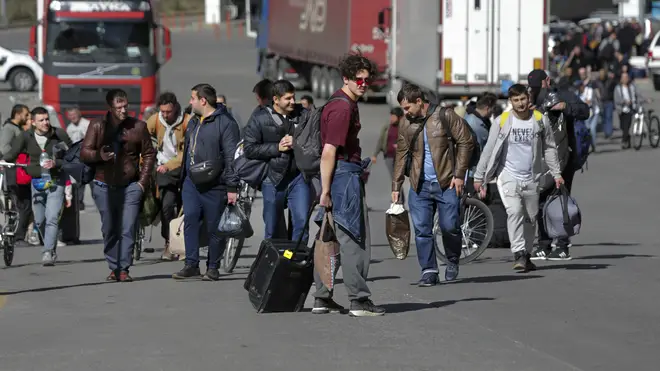
Clare Foges 6pm - 9pm
27 September 2022, 15:14

Tens of thousands of residents had already fled the regions amid the war.
Referendums that are expected to serve as a pretext for Moscow to annex Russian-held regions of Ukraine have concluded as the preordained outcome of the Kremlin-orchestrated votes heightened tension between Russia and the West.
The annexation of the four occupied regions in southern and eastern Ukraine, which could happen as soon as Friday, sets the stage for a dangerous new phase in the seven-month war in Ukraine.
Russia warned it could resort to nuclear weapons to defend what it claimed as its own territory, including newly acquired lands.

After the balloting, “the situation will radically change from the legal viewpoint, from the point of view of international law, with all the corresponding consequences for protection of those areas and ensuring their security”, Kremlin spokesman Dmitry Peskov said.
President Vladimir Putin has talked up Moscow’s nuclear option since last week after a Ukrainian counteroffensive led to battlefield setbacks and has the Kremlin’s forces increasingly cornered.
The balloting that started on Friday in the Kherson, Zaporizhzhia, Luhansk and Donetsk regions and a call-up of Russian military reservists ordered by Mr Putin are other strategies aimed at buttressing Moscow’s exposed position.
Dmitry Medvedev, the deputy head of the Russian Security Council chaired by Mr Putin, spelled out the threat in the bluntest terms yet on Tuesday.
“Let’s imagine that Russia is forced to use the most powerful weapon against the Ukrainian regime that has committed a large-scale act of aggression, which is dangerous for the very existence of our state,” he wrote on his messaging app channel. “I believe that Nato will steer clear from direct meddling in the conflict in that case.”

The US has dismissed the Kremlin’s nuclear talk as scare tactics.
Jake Sullivan, the US national security adviser, said on Sunday that Russia would pay a high, if unspecified, price if Moscow used nuclear weapons in the war in Ukraine.
The referendums asked residents of the regions in southern and eastern Ukraine whether they want the areas to become part of Russia, but the voting was anything but free or fair.
Tens of thousands of residents had already fled the regions amid the war, and images shared by those who remained showed armed Russian troops going door-to-door to pressure Ukrainians into voting.
Mariupol mayor Vadym Boychenko, who left the port city after the Russians finally seized it following a months-long siege, said only about 20% of the 100,000 estimated remaining residents cast ballots in the Donetsk referendum. Mariupol had a pre-war population of 541,000.
“A man toting an assault rifle comes to your home and asks you to vote, so what can people do?” he said during a news conference.
Western allies are standing firm on Ukraine, dismissing the votes as a sham.
French foreign minister Catherine Colonna said while visiting Kyiv on Tuesday that France was determined “to support Ukraine and its sovereignty and territorial integrity”.

Meanwhile, the mass call-up of Russians to active military duty has to some degree backfired on Mr Putin.
It has triggered a massive exodus of men from the country, fuelled protests in many regions across Russia and sparked occasional acts of violence.
On Monday, a gunman opened fire in an enlistment office in a Siberian city and gravely wounded the local chief military recruitment officer. The shooting came after scattered arson attacks on enlistment offices.
With Mr Putin’s back against the wall amid Ukraine’s battlefield successes, Russian media speculated he might follow up on last week’s partial mobilisation order by declaring martial law and shutting the nation’s borders for all men of fighting age.
Russian officials announced plans to set up a military recruitment office on the border with Georgia, one of the main routes of the exodus.

As Moscow works to build up its troops in Ukraine, Russian shelling continued to claim lives. At least 11 civilians were killed and 18 wounded by Russian barrages in 24 hours, Ukraine’s presidential office said on Tuesday.
Among the casualties were eight people, including a 15-year-old boy, who were killed by a Russian strike on the town of Pervomaiskyi in the north-eastern Kharkiv region.
Pavlo Kyrylenko, governor of the eastern Donetsk region where shells killed three people, said: “Every day of the referendum we count more dead in the Donbas, and those sad numbers show Russia’s real goals.”
Donetsk and Luhansk, which Moscow-backed separatists have partly controlled for eight years, together make up Ukraine’s industrial Donbas region.
The Ukraine war is still gripping world attention as it causes widespread shortages and rising prices not only for food but for energy, inflation hitting the cost of living everywhere, and growing global inequality.